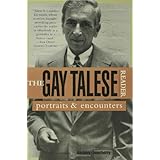
Average Reviews:

(More customer reviews)Are you looking to buy The Gay Talese Reader: Portraits and Encounters? Here is the right place to find the great deals. we can offer discounts of up to 90% on The Gay Talese Reader: Portraits and Encounters. Check out the link below:
>> Click Here to See Compare Prices and Get the Best Offers
The Gay Talese Reader: Portraits and Encounters Review"Intensely curious" is how Gay Talese describes himself on his arrival in New York City as a young man in the mid-1950s, a provincial from a community of immigrants in New Jersey. " But until I got a job in journalism I knew of no way to indulge my peculiar interest in the natural and unnatural order of city life."Talese's interest in the lifestyle of alley cats, the inside knowledge of doormen and charwomen and taxi drivers, and the various overlooked architectural marvels throughout the city was underappreciated by his bosses at "The New York Times." As punishment for his lackluster efforts on the Albany political beat, Talese was shunted to the obituaries desk. But to him it was an opportunity to write about the personal accomplishments of interesting people. "I was never happier," he says.
Each of the superb pieces in this collection of writing from the 1960s to the 1990s exemplifies his elevation of curiosity to an art form. The opening piece, "New York Is a City of Things Unnoticed," his first article for "Esquire," in 1960, (and the opening of his first book, "New York: A Serendipiter's Journey") combines elements from a number of stories he had written for the "Times." Talese portrays the city's vastness and variety in a catalog of wonders and personal vignettes and portraits, from the gallons of soap used on a big day at Yankee Stadium to the doorman with parts of three bullets in his head, to a snapshot of the city during its quietest hour (5 a.m.).
Many of these pieces are classic profiles of famous people. "Frank Sinatra Has a Cold," is a riveting portrait of a complex man at the center of his universe, not always comfortable, but always in command. For this piece - one of his most famous - Talese never spoke to the man, using only his considerable powers of observation and fleshing it out with brief interviews with family, friends, employees and fans.
There are several profiles of prize fighters, including a particularly poignant one of Floyd Patterson after his loss to Sonny Liston, in which Patterson describes himself as a coward: "He stopped. He stood very still in the middle of the room, thinking about what he had just said, probably wondering whether he should have said it." Talese pursues the subject and Patterson explains, "It's in defeat that a man reveals himself. In defeat I can't face people. I haven't the strength to say to people, `I did my best, I'm sorry, and whatnot.' " Over his career Talese has written 38 articles on Patterson, which may help explain why the fighter is so forthcoming.
"Joe Louis: The King as a Middle-Aged Man," and "Ali in Havana" also portray the fighters after their heyday. These portraits are affectionate, admiring. Though virtually crippled by Parkinson's disease, Ali signs his full name for autographs, though it takes him 30 seconds for each one. "He does not settle for a time saving `Ali' or his mere initials. He has never shortchanged his audience."
As for Louis, his reputation for naivety and, well, dimness, is legendary. "And so it was with some unexpected elation that I found Joe Louis to be an astute businessman in New York, a shrewd bargainer, and a man with a sense of humor often quite subtle."
A profile of the "New York Times" obituary writer, Alden Whitman, "Mr. Bad News" is a gem of appreciation, humor and personality as well as an inside look at the job where Talese honed his own profiling skills.
Two pieces show another side of Talese - rapier-sharp, satirical wit, made all the sharper for flashes of admiration. "Looking for Hemingway," portrays George Plimpton's "Paris Review" crowd as a group of dilettantish (but talented) poseurs, and "Vogueland," is a hilarious view of "Vogue" magazine's muscular snobbery.
Talese, all but invisible in his profiles, reflects on his own life and work in several later pieces; two on writing, "Origins of a Non-Fiction Writer," and "When I Was Twenty-Five," and one on the resurgence of Puritanism in New York, "Walking My Cigar." "The Brave Tailors of Maida" is taken from "Unto the Sons," his book about his Italian father.
Each of these wonderful pieces attests to Talese's talent as a close observer and a careful listener, skills honed from his childhood eavesdropping on customers at his parents' shop. Author of the bestsellers "The Kingdom and the Power" (about "The New York Times") his mafia profile, "Honor They Father" and his expose of sexual mores "Thy Neighbors Wife," as well as a previous collection, "Fame & Obscurity," Talese is a writer to savor.The Gay Talese Reader: Portraits and Encounters Overview
Want to learn more information about The Gay Talese Reader: Portraits and Encounters?
>> Click Here to See All Customer Reviews & Ratings Now